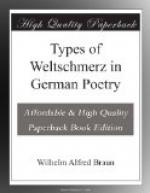CHAPTER I
=Introduction=
The purpose of the following study is to examine closely certain German authors of modern times, whose lives and writings exemplify in an unusually striking degree that peculiar phase of lyric feeling which has characterized German literature, often in a more or less epidemic form, since the days of “Werther,” and to which, at an early period in the nineteenth century, was assigned the significant name “Weltschmerz.”
With this side of the poet under investigation, there must of necessity be an enquiry, not only into his writings, his expressed feelings, but also his physical and mental constitution on the one hand, and into his theory of existence in general on the other. Psychology and philosophy then are the two adjacent fields into which it may become necessary to pursue the subject in hand, and for this reason it is only fair to call attention to the difficulties which surround the student of literature in discussing philosophical ideas or psychological phenomena. Intrepid indeed would it be for him to attempt a final judgment in these bearings of his subject, where wise men have differed and doctors have disagreed.
Although sometimes loosely used as synonyms, it is necessary to note that there is a well-defined distinction between Weltschmerz and pessimism. Weltschmerz may be defined as the poetic expression of an abnormal sensitiveness of the feelings to the moral and physical evils and misery of existence—a condition which may or may not be based upon a reasoned conviction that the sum of human misery is greater than the sum of human happiness. It is usually characterized also by a certain lack of will-energy, a sort of sentimental yielding to these painful emotions. It is therefore entirely a matter of “Gemuet.” Pessimism, on the other hand, purports to be a theory of existence, the result of deliberate philosophic argument and investigation, by which its votaries have reached the dispassionate conclusion that there is no real good or pleasure in the world that is not clearly outweighed by evil or pain, and that therefore self-destruction, or at least final annihilation is the consummation devoutly to be wished.
James Sully, in his elaborate treatise on Pessimism,[1] divides it, however, into reasoned and unreasoned Pessimism, including Weltschmerz under the latter head. This is entirely compatible with the definition of Weltschmerz which has been attempted above. But it is interesting to note the attitude of the pessimistic school of philosophy toward this unreasoned pessimism. It emphatically disclaims any interest in or connection with it, and describes all those who are afflicted with the malady as execrable fellows—to quote Hartmann—: “Klageweiber maennlichen und weiblichen Geschlechts, welche am meisten zur Discreditierung des Pessimismus beigetragen haben, die sich in ewigem Lamento ergehen, und entweder unaufhoerlich




